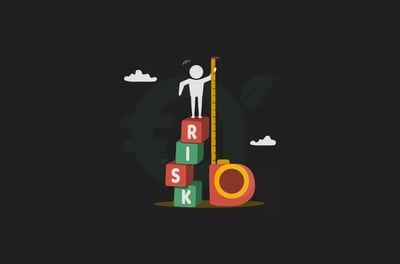Table Of Contents
- What Is Risk Management?
- What Are the Risks Involved in FOREX Trading?
- FOREX Trading Risk Management Strategies
- Learn about FOREX risk and trading
- Establish your risk appetite
- Keep your risk consistent
- Keep an eye on liquidity
- Master how to use leverage
- Create a good trading plan
- Insert stops and limits
- Take profit sensibly
- Manage your emotions
- Keep an eye on market moves
- Start with a demo account
- Set realistic profit targets
- Diversify your portfolio
- The Bottom Line
FOREX Risk Management Strategies 2026
As an experienced trader, I can tell you that financial trading is inherently risky, and investors regularly lose money. FOREX trading is no exception. It makes sense that to be a successful trader with a long career, you must take FOREX risk management techniques seriously. Risk management is not simply about limiting your exposure to losses, but it also involves laying the way for you to take profits in an orderly and sustainable fashion.
FOREX trading is the act of buying and selling world currencies on an exchange. This highly volatile market offers opportunities for profit, but it also carries risk. Many FOREX traders lose money not only due to a lack of inexperience or skill, but because of poor risk management.
FOREX risk management consists of a set of carefully considered actions that offer traders protection against the downsides of trading. If you take on more risk, you open yourself up to larger returns, but you also run the risk of heftier losses. This is why finding strategies to manage risk levels and minimize losses while maximizing gains is a big win for all types of traders.
FOREX risk management techniques not only protect you but can also help you earn profits in the long run. In this article, I will tell you everything you need to know about crafting a good FOREX risk management plan.
Risk management is the backbone of long-term trading success and protects against heavy losses
Traders should never risk more than 2% of their capital on a single trade regardless of confidence
Using stop-loss and take-profit orders can automate exits and reduce emotional decision-making
Leverage magnifies both gains and losses so new traders must tread carefully and keep detailed journals
Maintaining consistent position sizing helps avoid the trap of overconfidence after early wins
A strong trading plan with defined goals and exit rules reduces stress and supports discipline
Demo accounts offer risk-free environments to test strategies before going live with real funds
Diversifying across currency pairs can offset losses and provide more consistent profit opportunities
What Is Risk Management?
In my view, risk management is the process of identifying and mitigating risks associated with trading decisions. It could also involve, as I have mentioned, making provisions for receiving profits in a safe way, as profit-taking is also a risky exercise.
Why is risk management important? Well, all FOREX traders are in it to be successful and make money. To do this, they must master risk management. As vital as this discipline is, it remains one of the most overlooked parts of a trader’s journey. In the rush to start trading and making profits, many new investors move forward heedless of the dangers of trading. They do not protect themselves with a safety net.
With FOREX risk management, you can implement clear rules to make sure that the negative effect of every trade is managed. As with every strategy, you need to plan ahead and know what you intend to do before you start trading. If you try to insert risk management rules while you are trading, you could find it too difficult to manage them both at the same time.
Smart traders typically use tried-and-tested risk management techniques for FOREX trading to help them ride out the volatility in the currency market. They implement measures to manage uncertainty and reduce the risk of heavy losses by making emotional decisions in the heat of the moment. In the end, FOREX trading is a game of tiny percentages. This means that you must try to point out every factor in your favor.

What Are the Risks Involved in FOREX Trading?
By now you will have read many times in this article that there are risks involved with trading FOREX. What are these risks? In the section that follows, we discuss some of the main risks of trading:
Currency risk: This is the risk that comes with fluctuations in such a volatile market. Currencies are in a constant state of change in value relative to each other as market dynamics play out. These dynamics include national interest rates, economic indicators, national debt levels, policy announcements, and more. It may become more or less expensive to buy foreign currencies based on events in other parts of the world over which you have zero control.
Interest rate risk: Interest rates are managed at national levels by the central banks of countries. This is one of the key levers that affects currency volatility. FOREX prices respond to interest rate changes because the level of spending in an economy will increase or decrease, depending on the direction of the rate change and other fundamentals like consumer confidence.
Liquidity risk: This risk represents the danger that you cannot buy or sell an asset quickly enough to prevent a loss. Liquidity refers to how many instruments are available on the market – the money to buy and sell and the cash with which to buy and sell it – to effect quick trades. Even though the FOREX market is one of the most liquid markets in the financial world, there are often periods of illiquidity based on how well set up your broker is, or how markets are receiving news of government policies around foreign exchange.
Leverage risk: Leverage comes with the risk that your losses may be magnified when you trade on margin. Some brokers can give traders access to leverage as high as 500:1, which is great when the trader makes money, but can be catastrophic when they lose.
Risk of ruin: You could lose all your money and not be able to trade any more. This is the ultimate risk. Even when trading on leverage, effectively using someone else’s money, you still need to be able to put up some of your own cash to be able to trade on margin. If you trade recklessly and lose it all, your FOREX trading career could be ruined until you put up more capital.
Recommended Brokers
FOREX Trading Risk Management Strategies
From my own experience, here are some established risk-management-for-FOREX-trading strategies you can use to ensure you are trading as safely as possible. By using a combination of as many of these strategies as you can, you stand a chance of being successful. Over time, it will become second nature to work within these parameters.
Learn about FOREX risk and trading
This is one of the first rules of FOREX trading. Many brokers run marketing campaigns that promote the best parts of successful FOREX trading. These advertisements use images of beautiful people driving luxury cars and dining on yachts. What they don’t mention in these ads is the sobering truth, which is that before you can accumulate staggering wealth from trading (and very few traders actually achieve this), you need to work very hard at learning about how the FOREX market works. Not only that, but you also need to have a constant appetite to learn because new strategies and technologies come up all the time.
Establish your risk appetite
With every trade, the risks you take should be worth the trouble. Over time, you aim to be in the black, meaning your profit should outweigh your losses. As a FOREX trader, you will most certainly lose on individual trades. It is part of the territory, but your FOREX risk management plan should also set parameters under which the reward is worth the risk.
One main driver of your risk-taking should be the amount of capital you have available. Never take a big bet on individual trades, as this could become a bad habit. Many experts recommend that you stick to the 2% rule, which states that you should not risk more than 2% of your available trading capital on any one trade, no matter how appealing it is or how much you feel you are on a hot hand.
It is also a good idea to establish a good risk-reward ratio for all your trades. To arrive at your ideal risk-reward ratio, work out how much you are risking on each trade and what the potential gain is. Let us say that on a given trade, you stand to lose a maximum of $100, but you could also stand to gain $300. In this scenario, your risk-reward ratio is 1:3. Therefore, if you placed six trades using this ratio and were successful on just three of them, you would have made $900 in profit and $300 in losses, leaving you $600 in the black, despite only being right half the time.
Another element of your risk appetite is the art of selecting the right position size or the number of lots you take on a trade. This is crucial, as finding the ideal FOREX risk management and position size will both protect your account and increase your opportunities to make money.
Keep your risk consistent
I've seen that many newbies tend to get carried away by early wins and increase their positions as soon as they make a profit. This could lead to trouble, as going all in on a large position size and losing, especially on heavy leverage, can be the surest way to end your FOREX trading career prematurely.
Keep your risk consistent, even if the voice in your head is screaming for you to increase it. One of the most dangerous outcomes of early profits is when new traders become overconfident. Be risk-averse. This will serve you in the long run. A string of profitable trades can turn into a string of damaging losses at any time. Once you have established your FOREX risk management plan, you must set up rigid rules to decide on the best position sizes and risk-reward ratios.
Keep an eye on liquidity
I would say that one of the biggest risks you will face when trading FOREX is based on the changing nature of liquidity. As I have mentioned, liquidity simply refers to a situation in which there are enough buyers and sellers with whom to trade available currencies. Your broker should also be able to execute the trade, as this is also part of the liquidity equation. In the FOREX world, there is hardly ever a liquidity crunch among the major currencies. Returns may be small when trading long-established currencies like the USD and the GBP, but the upside is that there is always a thriving marketplace.
Liquidity tightens when trading minor currencies and can completely dry up when trading exotic currencies. While not surprisingly, liquidity is in plentiful supply when trading popular major currency pairs. Your broker plays a major role in how much liquidity is available to you as a trader. After all, if you are not trading directly on the open FOREX market but rather through a broker. It is the broker who will have to execute trades on your behalf. If they do not work with well-capitalized, liquid banking partners who can provide them with the cash to buy currencies on time, they will feel there is no liquidity. Therefore, large, reputable, and financially sound brokers should be the choice for most retail online traders, given their sufficient liquidity to effectively execute trades.
Master how to use leverage
Leverage is any type of trading that involves borrowing your broker’s money to trade more assets than you could afford with your own money. Normally, leverage works closely with margin. We've written an explainer on margin here. However, for clarity, margin is when the broker asks you to put up some of your own money as collateral. After all, the broker’s money is being used to enter a risky financial transaction, and the broker must protect its interests by making sure that if you lose, as happens very often with new traders, it can recover some of the loss.
With leverage, you only put down a small portion of the capital in your account, with the broker topping it up with funds of its own. Depending on your trading style, leverage trading becomes more attractive. If you are a scalper, a trader who enters hundreds of trades per day to make small profits, then leverage is exactly what you need to amplify your trading efforts.
However, leverage can expose you to bigger losses. We should never forget that in the world of trading far more people lose money than make money. Leverage, if not used responsibly, can lead to heavy losses. Therefore, many regulators take the burden of high leverage off individual traders by capping leverage levels. For example, in the UK, the Financial Conduct Authority (FCA) mandates that leverage limits are now capped at 30:1, and trader positions must be closed out when the available capital drops to 50% of the margin requirements.
Leverage trading is risky. As mentioned, risk is part of the package with trading. If traders could trade in markets that were not leveraged and had all the time in the world to think through their trades, they could reduce much of the risk associated with trading. Truth be told, they would also reduce many of the profits, too! Risk cannot be avoided but must be managed well.
The FOREX market is harder for new traders because everything moves so fast. There is a steep learning curve, and some of the hardest lessons learned come when you lose money. So, while you don’t need much capital to start trading, losing your early capital is often a price you pay for inexperience and a lack of knowledge.
The solution to leverage risk is to take control of your own habits and to be honest with yourself about the times when your emotions get in the way of making the right decisions or when you simply can't manage the instinctive pull of a bad habit. Keep a journal of all your leverage trades so you can have a visual reminder of how you are doing
Create a good trading plan
From my own trading career, I've seen how crucial it is to devise a good trading plan, as this can help make your FOREX trading easier by taking the decision-making tension out of every trade. In a market where discipline and holding your nerve are essential, a trading plan will help guide you through frenetic trading sessions by offering ready-made answers to key questions, such as what, when, why, and how much to trade. If you want a highly detailed primer on how to develop a trading plan, read our article here.
Set clearly defined goals. This practical advice is not always as attractive as the prospect of making extravagant profits, but being a successful trader is the result of making incremental improvements to your portfolio and to the number of successful trades and their value. So, you need to record and measure your successes and stick to clearly defined objectives.
Make sure that your FOREX trading plan is personal to you and considers your own preferences and tendencies. Invest some time in writing it down and even displaying your personal trading fundamentals in the workspace where you place most of your trades. Your decisions will be very personal, as will your losses and victories. You cannot copy anyone else’s trading plan. This is not to say that you cannot use the signals of other traders or even copy trading. These are staples of retail trading, but they become part of your personal trading plan, not the entirety of it.
In the early stages, keeping a written track of your progress is invaluable. Log what FOREX risk management strategies you wish to employ and at what levels you will stop your losses or take profits. Keep a log of your successes and failures. This could be in a simple spreadsheet, but you need a visual record of what your efforts are producing. Sometimes, stepping back in this way allows you to see where you are going wrong.
Insert stops and limits
As the FOREX market is particularly volatile, it is very important to decide on the entry and exit points of your trade before you open a position. Stop-loss orders and stop-limit orders can stem the bleeding and will reduce your losses if the value of your asset shifts against your position. Stop-loss orders give you the comfort that the execution will happen if the stop price is reached and the trade can be completed before the end of the trading session.
With stop-limit orders, you ensure a minimum trade price when you sell assets or an upper value when you purchase assets, provided the trade is executed. The key is to execute the price at your stop level or better.
Stop-loss and stop-limit orders are both used to limit potential losses on existing positions. It is important for you to understand how each of them works. Depending on the market you operate in, you may be called upon to adjust your positions under time pressure. The FOREX market is notorious for being time-sensitive. It is best to master these instruments and how they are applied.
There are different types of stops in FOREX trading. How you place your stop loss will depend on your preferences and experience. Normal stops shut down your position automatically if the market moves against you. However, there is no insurance against slippage. Guaranteed stops will always be closed out at exactly the specified price, eliminating the risk of slippage. With trailing stops, you can follow positive price movements and close your position if the market moves against you. Limit orders, as I have mentioned, will follow your profit target and close your position when the price hits your chosen level.
Take profit sensibly
Take profit orders, and do what it says on the label. It prompts the trader to take profit once a specified profit target has been reached. Human emotions often betray us, leading many traders to think they can keep riding a winning position past the point at which it makes sense. We don't say this lightly. There is much that every trader needs to learn about human trading psychology. This is where the take-profit order comes in so useful.
By having clear expectations for each trade, not only can you set a profit target and therefore take profit, but you can also settle on what the best level of risk is for the trade. In our earlier example on risk-reward ratio, I indicated that a trader could accept a ratio of 1:3. With a take-profit order, you can insert the profit level at precisely the point you feel comfortable.
Manage your emotions
I like to remind myself that an emotional trader is an inefficient trader. There is a certain irony: it is the joy of making profits that brings traders to the table, yet to be successful, they must keep a lid on their emotions. It is a common misconception that traders act on instinct and emotion, and that they only go by their gut feeling when making trades. To be a successful FOREX trader, you must be rational, calculated, and consistent. Only then can you hope to enjoy a long and fruitful career in the trading world. Decisions should be guided by planning, not emotion.
Some of the best advice regarding FOREX risk management techniques involves curbing your enthusiasm and not risking too much of your portfolio at once. You need to understand what you are going to do in a calculated way and stick to your plans.
Keep an eye on market moves
This strategy works best for longer-term FOREX traders who monitor headlines and listen to market sentiment for clues about the marketis direction. Although most used for longer-term investors, like stock traders, news and sentiment analysis can come in handy for the FOREX trader. As we can see with a high-profile currency like the USD, news of Federal Reserve monetary policy changes can affect its price quickly.
Good traders come to accept that to stay in touch with the market. They must keep an ear to the ground for breaking news and read as much analysis as they can to make predictive moves. FOREX trading is intrinsically linked to geopolitical changes and the macroeconomic factors at play in each country. By staying informed about political and business news, FOREX traders can become better equipped and act quickly to adjust their portfolios accordingly.
Start with a demo account
Before losing real money, it is in your interest to start day trading on a simulated basis. Demo accounts are designed to help traders improve their trading skills and test strategies without risking real money. Remember that simulated trading allows the trader to learn the broker’s Website and platform. By the time the real trading begins, a trader will need to understand how to navigate their way around the FOREX broker’s platforms and tools without losing crucial time referring to manuals or calling customer service.
Using a demo account is always a good idea. Why would you not practice in a no-risk environment when you would have more than enough risk by the time you enter the real world of trading? You can lose virtual money and be none the worse for it.
Set realistic profit targets
How much do we know about the profitability of FOREX trading? Information on this is hard to come by, but we do know that brokers are required to state on their websites that more traders lose money than make money. Most beginner traders make steady losses and modest profits but are sustained by the promise of making it big one day. As you can see, there is a lot of room to make losses before any significant profits. That’s why traders should always make sure their exposure on each trade is kept within a specified percentage of the account, and that entry and exit points are clearly defined and written down.
Diversify your portfolio
It is useful advice for FOREX traders not to commit too much capital to any one currency pair. Yes, you can become an expert at trading a certain currency pair and feel as if it is your niche, but there is so much more opportunity within other currency pairs. Also, if your favorite currency pair starts losing you money, as it inevitably will, it is always good to be making profits in other areas at the same time. Remember, FOREX trading takes expertise, which requires a concentrated study that can be applied across a range of currencies.
The Bottom Line
As a longtime trader, I know that financial trading is risky. The chance of losing money comes with the territory if you want to engage in this activity. Like everything else in life, risk is always easier managed if you can measure it and put FOREX risk management strategies in place to deal with the unpredictability. With a disciplined approach and good trading habits, taking on some risk is the only way to generate consistent rewards.
FAQ
There is no single risk management strategy that will eliminate all risk from trading. Rather, you should learn to apply a combination of tried and tested methods in line with your own portfolio needs. There is no silver bullet to removing risk from trading.
You should always use risk management strategies. Whether you are a newbie or an experienced trader, you will never not need to be prudent about how you trade. Of course, with time, many strategies will become internalized and will be easier to deploy.
You should always use risk management strategies. Whether you are a newbie or an experienced trader, you will never not need to be prudent about how you trade. Of course, with time, many strategies will become internalized and will be easier to deploy.
Yes and no. Yes, because major currencies will always come with enough liquidity and any broker worth their salt will be able to give you access to these currencies. No, because you can still lose money trading major currencies on leverage; and even if you do not abuse leverage, you could still lose money because you get your trades wrong.
As we have said, your FOREX risk management strategies are as personal as your portfolio. It all depends on your interests and preferences and your experience. You cannot find a ready-made risk-management package, even though the best brokers have all the best risk- management capabilities at your disposal. These include limits on leverage, access to sound research, ability to place stops and limits, as well as access to a demo account. You still need to customize the best combination of risk management strategies for yourself.
In principle, yes. Many of the best pieces of trading advice are universal. Instructions like controlling your emotions, keeping written track of your trades, working on a demo account, and inserting stops and limits, can be just as easily applied to other financial assets. Indeed, it is correct to say that cutting your teeth on FOREX trading could easily set you up to be a successful trader of other financial assets as it is a fast-moving market with a steep learning curve.






